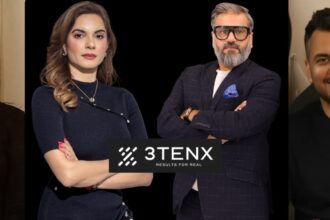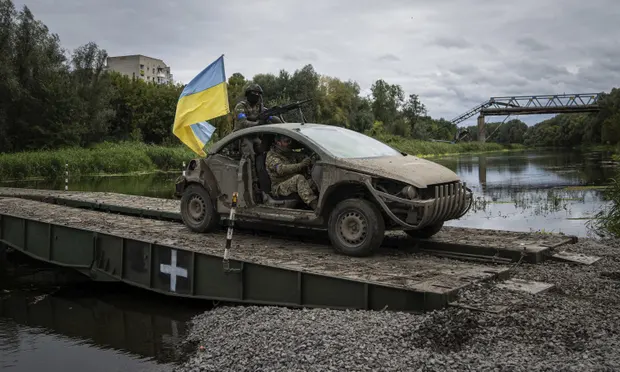Mass burial site with 440 bodies found in recaptured Izium; Ukraine’s loss of grain storage capacity threatens global food supply; Putin praises Xi’s ‘balanced’ approach to Ukraine war
- Ukrainian authorities have found a mass burial site of more than 440 bodies in the eastern city of Izium that was recaptured from Russian forces, a regional police chief has said. President Volodymyr Zelenskiy likened the discovery to what happened in Bucha outside Kyiv early in the war, Reuters reported. “Russia is leaving death behind it everywhere and must be held responsible,” he said.
- The European Union chief, Ursula von der Leyen, said she wanted the Russian president, Vladimir Putin, to face the international criminal court over war crimes in Ukraine. “That Putin must lose this war and must face up to his actions, that is important to me,” she told the TV channel of German news outlet Bild on Thursday.
- Ukraine has lost nearly 15% of its grain storage capacity in the war, threatening its role as a key food supplier to the world, a report said. The US government-backed Conflict Observatory said Russians had seized 6.24m tonnes of food storage capacity, and another 2.25m tonnes of capacity in Ukrainian hands had been destroyed, Agence France-Presse reported. As a result, farmers were running out of room to store their output for shipment, which could discourage plantings for the next crop, especially winter wheat, the report said.
- Pope Francis said it was morally legitimate for countries to provide weapons to Ukraine to help it defend itself from Russian aggression. “This is a political decision which it can be moral, morally acceptable, if it is done under conditions of morality. Self-defense is not only licit but also an expression of love for the homeland,” he said. “Someone who does not defend oneself, who does not defend something, does not love it. Those who defend [something] love it.”
- Vladimir Putin thanked the Chinese leader, Xi Jinping, for his “balanced” approach to the Ukraine crisis and blasted Washington’s “ugly” policies, at a meeting that followed a major setback for Moscow on the battlefield. Putin told his Chinese counterpart on Thursday: “We understand your questions and your concerns in this regard, and we certainly will offer a detailed explanation of our stand on this issue during today’s meeting, even though we already talked about it earlier.”
- Germany will supply Ukraine with additional armoured vehicles and rocket launch systems but will not provide the battle tanks that Kyiv has long asked for, says the German defence minister, Christine Lambrecht. She said on Thursday that Soviet-made BMP-1 infantry fighting vehicles would also “very quickly” head to Ukraine from Greece.
- The UN nuclear watchdog’s 35-nation board of governors passed a resolution demanding Russia end its occupation of the Zaporizhzhia nuclear power plant in southern Ukraine, Reuters reports. Thursday’s resolution is the second on Russia’s invasion of Ukraine passed by the International Atomic Energy Agency’s board.
- The US president, Joe Biden, announced a new $600m arms package for Ukraine, according to a White House memo sent to the state department on Thursday. Reuters reports the memo does not detail how the money will be used, but sources said it was expected to include munitions and more Himars rocket systems.
- The US has imposed new sanctions on 22 Russian individuals and two Russian entities. The people include Maria Alexeyevna Lvova-Belova, Russia’s presidential commissioner for children’s rights, who has led Russia’s efforts to deport thousands of Ukrainian children to Russia and forced the adoption of Ukrainian children into Russian families. The entities include Task Force Rusich, a neo-Nazi paramilitary group that has participated in combat alongside Russia’s military in Ukraine.
- A Ukrainian volunteer medic captured by Russian forces during their deadly siege of Mariupol delivered devastating testimony before US lawmakers on Thursday, recounting her experiences of torture, death and terror. Yuliia Paievska, who was detained in the port city in March and held by Russian and pro-Russia forces for three months, spoke before the Helsinki commission, a government agency created in part to promote compliance with human rights internationally.
Thank you for joining us from India.
Is the tide turning? Ukraine’s counteroffensive is changing the dynamic of war. Russia is on the back foot, for now at least. The sudden advance in the northeast will be good for morale in occupied Ukraine – and in the western capitals supporting Kyiv.
It’s our job at the Guardian to decipher a rapidly changing landscape, and report the facts in sober fashion, without getting carried away. Our correspondents are on the ground in Ukraine and throughout the globe delivering round-the-clock reporting and analysis during this fluid situation.
We know there is no substitute for being there – and we’ll stay on the ground, as we did during the 1917 Russian Revolution, the Ukrainian famine of the 1930s, the collapse of the Soviet Union in 1991 and the first Russo-Ukrainian conflict in 2014. We have an illustrious, 200-year history of reporting throughout Europe in times of upheaval, peace and everything in between. We won’t let up now.
Tens of millions have placed their trust in the Guardian’s fearless journalism since we started publishing 200 years ago, turning to us in moments of crisis, uncertainty, solidarity and hope. We’d like to invite you to join more than 1.5 million supporters from 180 countries who now power us financially – keeping us open to all, and fiercely independent.
Unlike many others, the Guardian has no shareholders and no billionaire owner. Just the determination and passion to deliver high-impact global reporting, always free from commercial or political influence. Reporting like this is vital to establish the facts: who is lying and who is telling the truth.
And we provide all this for free, for everyone to read. We do this because we believe in information equality. Greater numbers of people can keep track of the events shaping our world, understand their impact on people and communities, and become inspired to take meaningful action. Millions can benefit from open access to quality, truthful news, regardless of their ability to pay for it.






